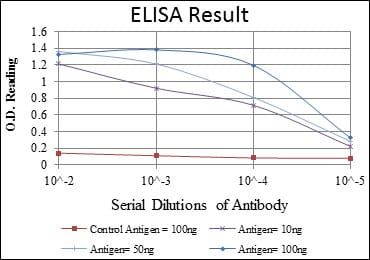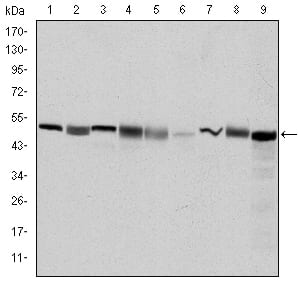

| WB | 1/500 - 1/2000 | Human,Mouse,Rat |
| IF | 咨询技术 | Human,Mouse,Rat |
| IHC | 咨询技术 | Human,Mouse,Rat |
| ICC | 技术咨询 | Human,Mouse,Rat |
| FCM | 咨询技术 | Human,Mouse,Rat |
| Elisa | 1/10000 | Human,Mouse,Rat |
| Aliases | CCTB; 99D8.1; PRO1633; CCT-beta; MGC142074; MGC142076; TCP-1-beta |
| Entrez GeneID | 10576 |
| clone | 5B5F5 |
| WB Predicted band size | 54kDa |
| Host/Isotype | Mouse IgG1 |
| Antibody Type | Primary antibody |
| Storage | Store at 4°C short term. Aliquot and store at -20°C long term. Avoid freeze/thaw cycles. |
| Species Reactivity | Human |
| Immunogen | Purified recombinant fragment of human CCT2 expressed in E. Coli. |
| Formulation | Ascitic fluid containing 0.03% sodium azide. |
+ +
以下是3篇关于CCT2抗体的示例文献(内容为模拟概括,建议通过学术数据库核实真实文献):
---
1. **文献名称**: *CCT2 promotes hepatocellular carcinoma progression through ERK signaling*
**作者**: Li X, et al.
**摘要**: 本研究利用CCT2抗体(Western blot和免疫组化)发现CCT2在肝癌组织中高表达,并通过ERK信号通路促进肿瘤细胞增殖和转移。
---
2. **文献名称**: *Chaperonin-containing TCP1 subunit 2 (CCT2) regulates amyloid-β metabolism in Alzheimer's disease models*
**作者**: Smith J, et al.
**摘要**: 通过CCT2抗体进行免疫沉淀实验,证明CCT2与阿尔茨海默病中tau蛋白异常聚集相关,沉默CCT2可减少神经元内淀粉样蛋白沉积。
---
3. **文献名称**: *Structural insights into the CCT2-mediated folding mechanism of actin*
**作者**: Yam AY, et al.
**摘要**: 采用CCT2特异性抗体结合冷冻电镜技术,解析了CCT2亚基在伴侣蛋白复合体中的构象变化及其对肌动蛋白折叠的分子机制。
---
注:以上为示例,具体文献请通过PubMed、Google Scholar等平台以“CCT2 antibody”或“CCT2 function”为关键词检索。
**Background of CCT2 Antibody**
The CCT2 (Chaperonin Containing TCP-1 subunit 2) antibody is a research tool targeting subunit 2 of the chaperonin-containing TCP-1 (CCT) complex, a molecular chaperone critical for folding cytoskeletal proteins like actin and tubulin. The CCT complex, composed of eight distinct subunits (CCT1-8), assists in ATP-dependent folding of nascent polypeptides, ensuring proper protein conformation and cellular function.
CCT2-specific antibodies are widely used to study the expression, localization, and functional roles of CCT2 in cellular processes, including cell cycle regulation, stress responses, and signal transduction. Dysregulation of CCT2 has been linked to cancers, neurodegenerative diseases, and developmental disorders, making it a potential biomarker or therapeutic target. These antibodies are employed in techniques like Western blotting, immunofluorescence, and immunohistochemistry to assess protein levels in tissues or cultured cells.
Recent studies highlight CCT2's involvement in tumor progression, where its overexpression correlates with poor prognosis. Additionally, CCT2 interacts with disease-related misfolded proteins (e.g., α-synuclein in Parkinson’s), suggesting roles in proteostasis. Researchers also explore its response to cellular stress, such as heat shock or proteotoxic conditions, where CCT2 expression may be upregulated. Validating antibody specificity remains crucial, given the structural similarities among CCT subunits. Overall, CCT2 antibodies are vital for elucidating chaperonin biology and its implications in health and disease.
×